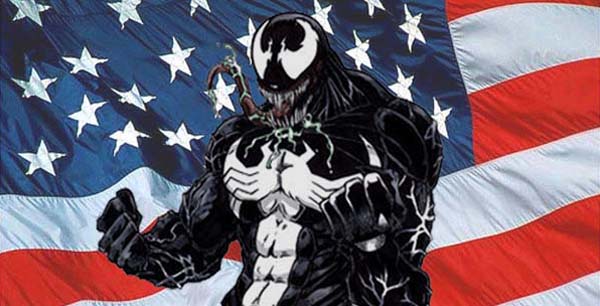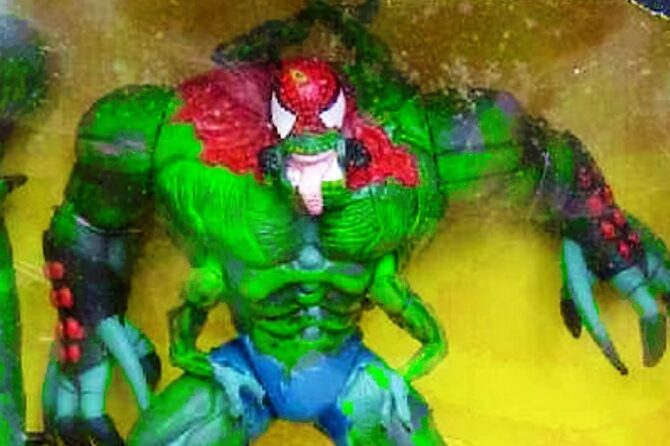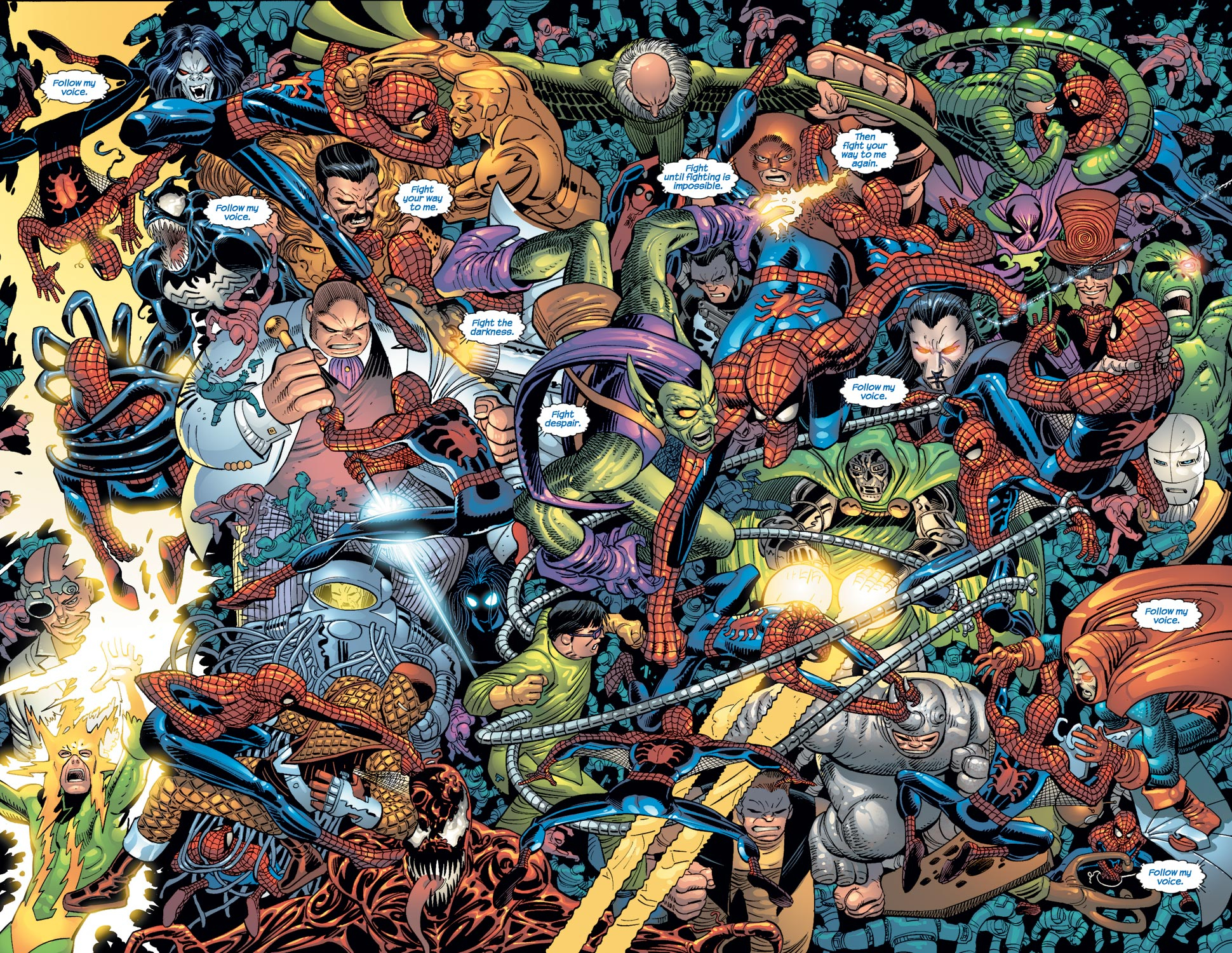In this instalment we use a bit of real life psychoanalysis to dive into the mind of Eddie Brock.

Dark Delusions
Last time I stated that a vital part of Brock’s personality is his hypocrisy. However what must be understood is that this hypocrisy is deeply interconnected with deeply held delusions.
Put simply Eddie Brock was a psychotic who as part of his particular psychosis had a real life mental condition known as ‘Delusional Disorder’.* This means he would have a certain loss of contact with reality and could/would thus become convinced of things which are not true.
A delusion is a belief that is held with strong conviction despite superior evidence to the contrary…
…Although non-specific concepts of madness have been around for several thousand years, the psychiatrist and philosopher Karl Jaspers was the first to define the three main criteria for a belief to be considered delusional in his 1913 book General Psychopathology.[1] These criteria are:
· certainty (held with absolute conviction)
· incorrigibility (not changeable by compelling counterargument or proof to the contrary)
· impossibility or falsity of content (implausible, bizarre, or patently untrue)[2]
Furthermore, when a false belief involves a value judgment, it is only considered a delusion if it is so extreme that it cannot be, or never can be proven true. For example: a man claiming that he flew into the sun and flew back home. This would be considered a delusion,[3] unless he were speaking figuratively, or if the belief had a cultural or religious source.
Reread Eddie Brock’s account of his fall from grace, particularly his reason for hating Spider-Man. Doesn’t that fit the above criteria quite a bit?**
Let me be clear here. The Eddie Brock of ASM #300 (though not necessarily of later stories) is not someone who would literally hallucinate and see/hear things that were not there. That is a different mental condition altogether. Rather his interpretations of reality would not be like those of other people. It would be like hearing an obvious compliment but truly believing it to be a scathing insult, only much more extreme than that.
This is corroborated in (the canonically dubious) Uncanny Origins #7 where the narrator outright states that Venom sees himself in a way that is at odds with the reality of his actions. Later in the story when Venom has abandoned his vendetta against Spider-Man he even admits to himself that he wasn’t seeing things the way they were.


In Brock’s case he might very well have been delusional from the time he was first contacted by Emil Gregg. This could very well provide a different explanation for why Brock felt Sin Eater was worthy of sympathy.
In the comments section to Part 6, one commenter said as part of a larger response essentially said that it is highly unlikely that someone as unstable as Brock was depicted as could have ever been a respected journalist.
However in reality this isn’t really true.
Putting aside how Brock could have always been mentally unstable but simply got worse by the time of ASM #300, the perhaps alarming reality is that if you suffer from delusions that doesn’t mean you can’t function in your day-to-day life. Brock could have walked around for years perceiving aspects of reality in a different way to most people and still had a respected career as a journalist with no one the wiser to his condition.
Scapegoating
Alternatively it is highly likely that Brock developed a case of Delusional Disorder as a direct result of an inability to accept his own part in ruining his life/career. This then led to a strong desire to scapegoat his failings onto somebody else. Notice how in ASM #300 he even admitted that he made an ‘error in judgement’ but is clearly doesn’t see this as the real cause of his misfortunes, instead laying the blame on someone else.
His profession might even have played into these delusions. As a journalist Brock would have developed the skills needed to spin stories and manipulate factual details. Thus it’s not unreasonable that he’d have deliberately and/or subconsciously been employing those skills to paint himself in an absolving light.
These delusions are also the root of his ridiculous assertions about how Stan Carter might have stopped his killing spree. He seriously entertains the idea that someone as obviously disturbed and unhinged as Carter (who’s instability was a matter of public knowledge) might simply have ‘stopped’. It is patently delusional and also smacks of Brock trying to construct a feeble narrative to justify his hatred for Spider-Man, which is also rooted in these serious delusions. Indeed Brock is so delusional that he places all blame onto Spider-Man despite the fact that as soon as Carter struck again his story would’ve been debunked anyway. This is to say nothing of the consequent investigation into Gregg.
Simply put Brock’s vendetta against Spidey was motivated by an inability to accept his own failings combined with a further inability to perceive reality in a sane and rational way.
This is an interpretation corroborated by numerous stories published after ASM #300.
Michelinie himself implies this idea in Amazing Spider-Man #375. In one panel he had Spider-Man state that Venom cannot be reasoned with because he just sees what he wants to see.

Paul Jenkins in Spectacular Spider-Man Volume 2 #5 had Spider-Man call out Eddie Brock, labelling him as someone who’s scapegoated the problems in his life onto someone else.

Roberto Aguirre-Sacasa in Sensational Spider-Man Volume 2 #38 all but spells this interpretation out for you.
In the issue Eddie Brock systematically blames Spider-Man for everything that went wrong in his life. This includes his cancer, something he even admitted he couldn’t blame Spider-Man for, but only because he had yet to figure out how it was his fault.***


Finally Zeb Well’s also touched on the notion in his (non-canonical) mini-series Venom: Dark Origin, which revisits Eddie Brock’s life and the events of ASM #299-300. In the final issue when Brock explains why be blames Spider-Man for his career failing and his considering suicide Spider-Man retorted that Brock only felt that way because it was easier than admitting he screwed up.

All pretty clear evidence of Brock’s inability to accept his mistakes and his delusional nature wouldn’t you say?
Yet, despite the overwhelming evidence that makes Venom’s mental instability obvious many readers of ASM #300 (and consequent Venom stories continue) to either not notice or unjustifiably dismiss this key facet of the character. And it is rather frustrating because it addresses most of their criticisms of his motivations and origin.
Perhaps Brock isn’t the only hypocrite around?
A Matter of Perspective
In their defence, whilst Brock’s delusional nature might have been present in ASM #300, the story didn’t just spoon-feed the concept to readers. This is where the communication problems of the story are perhaps most prevalent.
You will recall how in Part 5 David Michelinie explained the scene where Brock revealed himself to Spidey was played as a shocking moment because it was written from Peter’s POV, not the readers’. Well it’s likely that as the scene continued the same kind of methodology was applied to Brock’s character as he conveyed his origin; after all he was the one telling the story and having the flashback.
At face value it might have seemed as though the story was seriously implying Brock’s actions were reasonable. That there was obvious valid cause for Brock to have blamed Spider-Man for his misfortunes and that his rationale for Carter stopping his killing spree was logical.
But the only reason the story was presented this way is because it was Brock himself giving account of all that stuff. In his own twisted mind all those things held up to scrutiny and he passionately believed them. He believed them either because not believing them would mean accepting the devastating fact that he was the one who ruined his life and/or because he couldn’t help but believe them because he doesn’t perceive reality correctly. Or perhaps it was a combination of the two.
It was not the case that Michelinie or McFarlane themselves honestly bought Brock’s logic, nor was it their intention that the readers should either. Rather the intention in Brock’s flashback (given context by his actions at points before and after in the issue) was to convey the fact that Brock was clearly mentally unhinged.
Neither the narrator nor Spider-Man ever directly claim that in the issue, but the obvious contradictions inherent in the story alongside Brock’s violent tendencies (some of which he patently delighted in) should make that pretty obvious. As should Spider-Man’s own dialogue when he calls Venom ‘nuts’ and later refers to him as ‘a homicidal maniac’.

As further food for thought, consider that this is Spider-Man we are talking about.
Peter Parker has a tendency to blame himself for things, including things that aren’t really his fault. He’s a guy who accepts responsibility for things and that is critical to the point of the character. But to my knowledge Peter has never actually blamed himself for allegedly ruining Brock’s life, not even Michelinie’s own run.
Much later in Michelinie’s run (ASM #383-385) Spider-Man is put on trial for bringing the symbiote to Earth and in doing so inadvertently unleashing Venom, Carnage and all the other symbiotes. Yet a central point of the story is to assert that Spider-Man in fact does not feel he is truly responsible for this alleged crime and doesn’t feel guilty about it.


Whilst Michelinie should probably have communicated Brock’s insanity more clearly to readers, it is still nevertheless evidently present and should therefore be understood as integral to the character and his motivations and core concept.
Next time we take an even deeper dive into Brock’s twisted mind.
*It should be noted that someone who is psychotic is not the same thing as someone who is psychopathic.
**It should also be noted as food for thought that David Michelinie in ASM #296-297 as well as in ASM #317 (which also featured Venom) had Spider-Man interact with a mental health doctor and utilize psychology as a means of stopping Doc Ock’s scheme and defeating Venom respectively. He also wrote a story in which Tony Stark became an alcoholic in his iconic run on Iron Man with Bob Layton. Whilst not perfect (particularly in regards to Stark’s ‘recovery’) it was relatively realistic. I’m not suggesting Michelinie was well read in the subject of psychology, but he seemed to have a certain degree of rudimentary understanding in order to implement some of the concepts in his writing.
***Additionally Sensational Spider-Man #38 implies Brock learned of his cancer after bonding with the symbiote. However in Jenkins’ Spectacular Spider-Man #5, it is stated that Brock knew before that point in time. This again further implying he’s out of touch with reality.
P.S. Venom: the Hunted #1 corroborates a lot of what I’ve been saying above. In the issue psychologist Doctor Ashley Kafka heavily implied that Brock was already psychotic by the time he encountered the symbiote and that said psychosis was actually exacerbated by having an alien consciousness bonded to him. She went on to say that in the long term Brock would lose more contact with reality, become more paranoid and act out violently.










